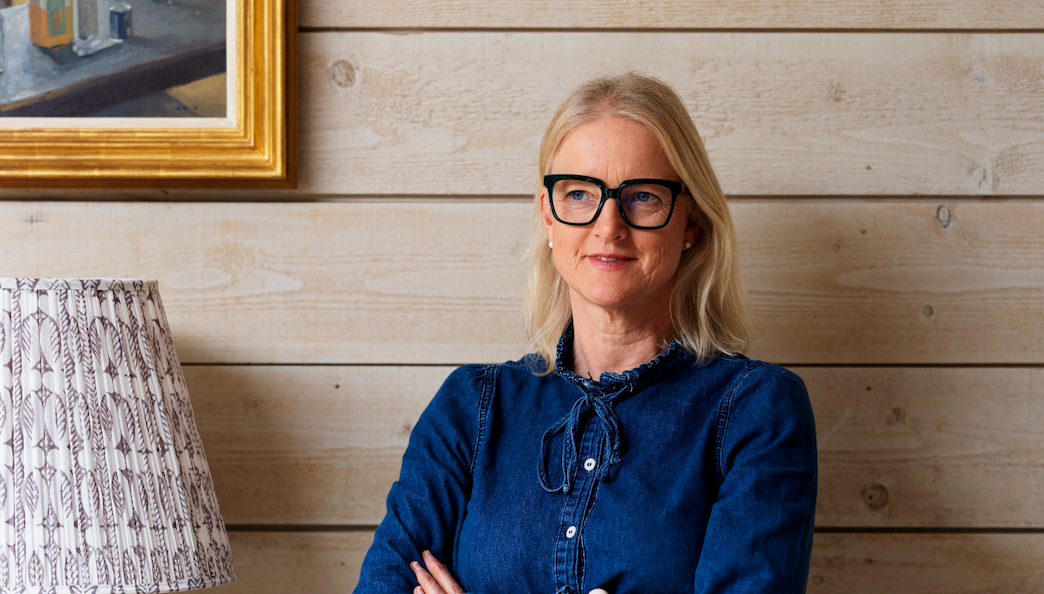British designer Emma Sims-Hilditch had an unlikely starting point for her design career: the production office of famed director Ridley Scott. After studying business, she took a job as a receptionist at the London office of Scott Free Productions—making tea and coffee for Ridley and his brother and company co-founder Tony before moving her way up to production assistant and working on large-scale commercials. “It was really amazing training,” she tells host Dennis Scully on the latest episode of The Business of Home Podcast. “It was a bit Devil Wears Prada—it was that kind of place, but that’s why they were the best.”
At the time, Sims-Hilditch was in her mid-20s, and as she looked around the office at the other employees, she saw many women in their 30s, 40s or 50s who didn’t have time for a personal life and decided to chart a different course. With her now-husband, John, she moved to the English countryside, where they bought and renovated a home built in 1790 and had three children. Along the way, she launched a curtain-making business out of their kitchen—a venture that took off after she designed curtains for her neighbor, the musician Roland Orzabal of Tears for Fears, and has since evolved into one of the U.K.’s leading architecture and design studios, Sims Hilditch.
Now she’s serving as the creative director for the company she founded, which employs a team of nearly 40. To help run her business, Sims-Hilditch took a couple of lessons she learned early on working for Scott: Stay organized and be dramatic. “What I saw was that it’s not just about the creativity [when] making a movie or making a commercial. It’s about the organizational side, the production side that goes into it. And whether it’s Wow!house or a big [client] project, I’d say half of the job is organizational. Half of it’s incredibly creative,” she says. “That whole sort of education in set design made me think it’s all about drama. You have to make your interiors dramatic. He taught me about scale and proportion. For example, when choosing a chandelier or a lantern for Wow!house, many clients would choose size medium, but I went for size extra large.”
Elsewhere in the episode, the designer discusses how she has invested in her team’s development, the difference between American and English clients, and why the most challenging part of her business is choosing what not to do.
Crucial insight: Sims-Hilditch organizes her office around what she calls “The George Clooney Effect”: “I said to the team, ‘I want you to think that at any point, day or night, when you’re here, George could walk in the door, he might stop by. He could stop by and ask for a cup of coffee, so I want our studio to be George Clooney–ready,’” she says. “We live and breathe organization. I think it’s just creating that sense of calm, and that’s what people say when they walk into a Sims Hilditch home—everything just feels calm, and I think that’s because everything is organized. There’s no clutter, and there’s a place for everything.”
Key quote: “Everything in Britain is very different from the States. I think the interior design industry [here] is sort of kept under the radar. Clients don’t necessarily want to say that they’ve used a designer. They’re not proud of their designer [like in] this amazing way in America, where the designer is a person who you can say your house was designed by and then be proud of that fact. I think British people do really appreciate interior designers—it’s just that they're not like these A-list film stars that they are in the States. They’re more practical people. We’re not there to be on a pedestal. We’re there to help them deliver this beautiful home.”
This episode is sponsored by Ernesta. Listen to the show below. If you like what you hear, subscribe on Apple Podcasts or Spotify.
The Thursday Show
Host Dennis Scully and BOH executive editor Fred Nicolaus discuss the biggest news in the design world, including Schumacher’s recent acquisition, how designers are gaming ChatGPT, and the rise of the dog room. Later, legendary industry analyst Jerry Epperson joins the show to discuss the state of the furniture business.
This episode is sponsored by Loloi. If you like what you hear, subscribe on Apple Podcasts or Spotify.





























